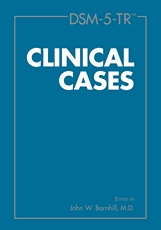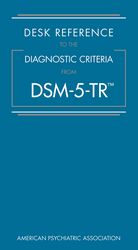Public Health Aspects of Diagnosis and Classification of Mental and Behavioral Disorders
Refining the Research Agenda for DSM-5 and ICD-11
View Pricing
Description
Public Health Aspects of Diagnosis and Classification of Mental and Behavioral Disorders: Refining the Research Agenda for DSM-5 and ICD-11 provides a comprehensive summary of the current state of mental health classification in the United States and internationally, fostering a better understanding of primary research and clinical needs and facilitating the efforts of service planners, researchers and trainees to address current use of psychiatric diagnosis in the public health sector. The volume reflects the proceedings of a research planning conference convened by the APA and World Health Organization (WHO) that focused on public health aspects of the diagnosis and classification of mental disorders.
Highly relevant to the ongoing development of DSM-5 and ICD-11, the book includes the background papers prepared and presented by the Conference Expert Groups. The resulting collection:
- Discusses the current state of mental illness prevention efforts and the role of public health in supporting them—critical topics, given that development of effective strategies to reduce mental illness around the world depends on the accuracy with which risk and protective factors can be identified, defined, and understood.
- Features international perspectives on public health implications of psychiatric diagnosis, classification, and service, providing viewpoints that are broad and more globally relevant.
- Views mental health education, and awareness on a macro level, including its impact on social and economic policy, forensics and the legal system, and education. This approach facilitates the continued development of a research base in community health and promotes the establishment of programs for monitoring, treating, and preventing mental illness.
- Addresses many fascinating and clinically relevant issues, such as those raised by the concept and the definition of mental disorders and how these impact psychiatric services and practice by individual providers.
This collection should prove useful to the advisory groups, task forces, and working groups for the revision of these two classifications, as well as for researchers in the area of diagnosis and classification, and more generally in public health.
Contents
- Contributors
- Foreword
- Introduction: Public Health and the Classification of Mental Disorders
- Preface: WHO Perspectives on Stakeholder Involvement in Revision of the Diagnosis and Classification of Mental Disorders
- Chapter 1. SERVICE USER AND CARER STAKEHOLDER PERSPECTIVES ON THE PUBLIC HEALTH ASPECTS OF DIAGNOSIS AND CLASSIFICATION OF MENTAL ILLNESSES
- Chapter 2. PREVENTION OF MENTAL DISORDERS: IMPLICATIONS FOR REVISION OF PSYCHIATRIC DIAGNOSIS AND CLASSIFICATION
- Chapter 3. CAPTURING COMPLEXITY: THE CASE FOR A NEW CLASSIFICATION SYSTEM FOR MENTAL DISORDERS IN PRIMARY CARE
- Chapter 4. USE OF DIAGNOSIS IN FORENSIC PSYCHIATRY
- Chapter 5. ECONOMIC CONSEQUENCES OF REVISING THE DIAGNOSTIC NOMENCLATURE FOR MENTAL DISORDERS
- Chapter 6. EDUCATION AND TRAINING
- Chapter 7. STATISTICS AND INFORMATION SYSTEMS
- Chapter 8. TRANSLATING PSYCHIATRIC DIAGNOSIS AND CLASSIFICATION INTO PUBLIC HEALTH USAGE
- Chapter 9. FORMULATION OF FUNCTIONING, DISABILITY, AND CONTEXTUAL FACTORS IN THE DIAGNOSIS OF MENTAL DISORDERS IN DSM AND ICD
- Index
Contributors
- Margarita Alegria
Francesco Amaddeo
Paul Appelbaum
Julio Arboleda-Florez
Bruce Arroll
Hugo Barrionuevo
Aksel Bertelsen
Richard J. Bonnie
M. Botbol
Daniel Hugh Chisholm
John Cooper
Frank deGruy
Horst Dilling
Christopher Dowrick
Patricia Esparza
Michael First
Sandra Fortes
Linda Gask
Howard H. Goldman, M.D., Ph.D.
Dante Grana
Rafia Gubash
Walter Gulbinat
Oye Gureje
Deborah Hasin
Gerhard Heinze
Helen Herrman
John Hirdes
Fritz Hohagen
Clemens Hosman
Marcela V. Horvitz-Lennon
Teh-Wei Hu
Eva Jane-Llopis
David Katerndahl
Michael Klinkman
Nobuko Kobayashi
Norbert Konrad
Alexander Kornetov
Oliver Lewis
Itzhak Levav
Janet Meagher
Maria Elena Medina-Mora
Alberto Minoletti
Malik Mubbashar
- Srinivasa Murthy
David Ndetei
Inger Nilsson
Frank G. Njenga
Olabisi Odejide
Edgardo Perez
Robert Plovnick, M.D., M.S.
Svetlana V. Polubinskaya
Darrel A. Regier, M.D., M.P.H.
David Reiss
Genevra Richardson
Diana Rose
Khalid Saeed
Norman Sartorius, M.D., Ph.D.
Shekhar Saxena, M.D.
Liz Sayce
Pratap Sharan
Shona Sturgeon
Carlos Tellez
Graham Thornicroft
Francisco Torres-Gonzalez
Pichet Udomratn
Jerome C. Wakefield
Mitchell Weiss
Liu Xiehe
About the Authors
Shekhar Saxena, M.D., is Director of the Department of Mental Health and Substance Abuse at the World Health Organization in Geneva, Switzerland.
Patricia Esparza, Ph.D., is Research Professor and clinical psychologist in the Department of Psychology and Counseling at Webster University in Geneva, Switzerland.
Darrel A. Regier, M.D., M.P.H., is Director of the American Psychiatric Institute for Research and Education and Director of the Division of Research at the American Psychiatric Association in Arlington, Virginia; and Vice-Chair of the DSM-5 Task Force.
Benedetto Saraceno, M.D., FRCPsych, is Professor of Psychiatry and Director of the World Health Organization Collaborating Center on Mental Health of the University of Geneva in Geneva, Switzerland.
Norman Sartorius, M.D., Ph.D., is President of the Association for the Improvement of Mental Health Programs in Geneva, Switzerland.
Related Products
Carousel Control - items will scroll by tabbing through them, otherwise arrows can be used to scroll one item at a time








